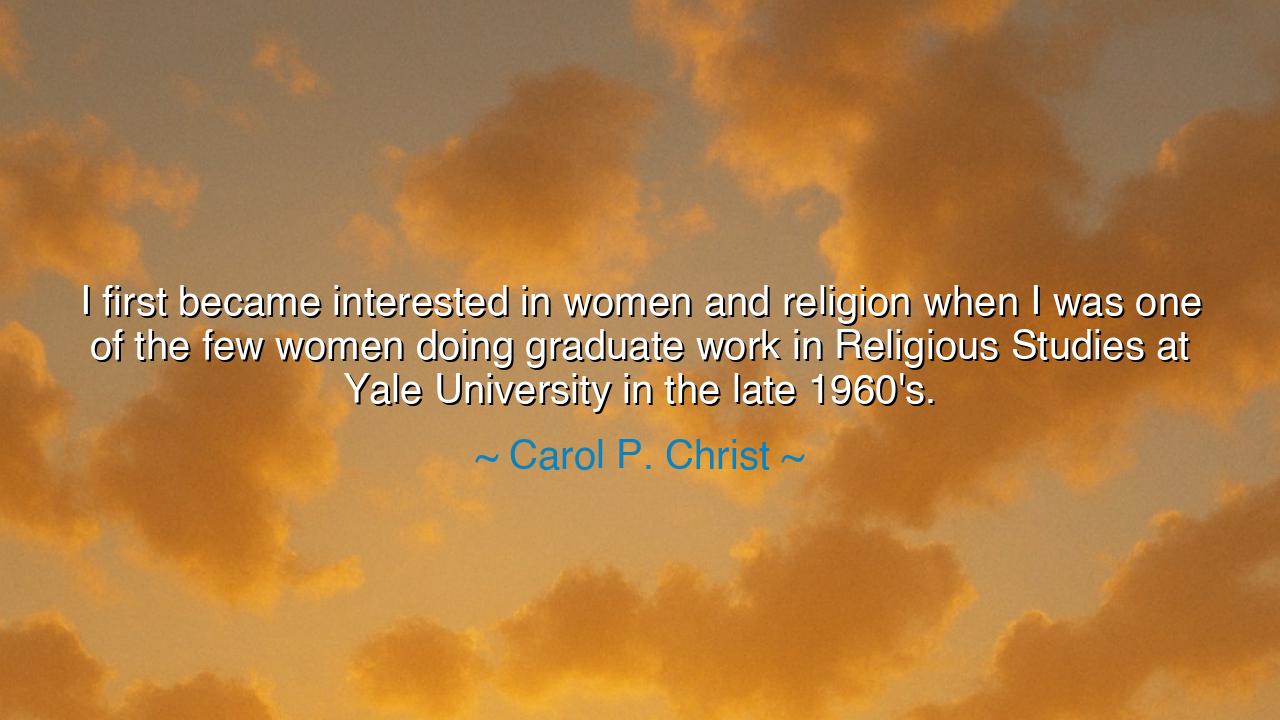
I first became interested in women and religion when I was one of
I first became interested in women and religion when I was one of the few women doing graduate work in Religious Studies at Yale University in the late 1960's.






The words of Carol P. Christ — “I first became interested in women and religion when I was one of the few women doing graduate work in Religious Studies at Yale University in the late 1960’s.” — shimmer with quiet defiance and prophetic insight. Beneath their scholarly calm lies a voice that would become one of the great awakeners of the modern age — a voice that questioned the foundations of spiritual authority and sought to restore to the sacred the forgotten presence of the feminine. In this reflection, Christ recalls the beginning of her journey — a journey not merely of academic inquiry, but of revelation. For she did not enter the halls of theology to accept its answers, but to expose its silences — to ask why, in the great stories of the divine, the image of woman had been erased.
When Carol P. Christ entered the world of Religious Studies at Yale University in the 1960s, she walked into a citadel built almost entirely by men. Theology, that ancient discipline devoted to the study of the divine, had long spoken with one voice — masculine, monolithic, unquestioned. The divine had been described as “Father,” the prophets and priests were men, and the structures of faith reflected the hierarchies of patriarchy. To be a woman in that realm was to stand as a stranger in her own temple. It was there, amidst the echoing corridors of male thought, that Christ began to sense the weight of absence — the absence of women’s stories, women’s wisdom, women’s sacredness. That absence became her calling.
Her awakening came at a time when the world itself was trembling with change. The late 1960s were an age of revolution — not only in politics and culture, but in consciousness. The feminist movement was rising, demanding equality in the home, the workplace, and the law. But Carol P. Christ’s insight went further: she saw that even the roots of spirituality — the myths, rituals, and symbols that shaped civilization — were steeped in imbalance. She dared to ask: What if God were not only He, but also She? What if divinity, like creation itself, were both masculine and feminine — or beyond both entirely? These questions, once unthinkable, became the seeds of a new theology — the theology of the Goddess, the theology of wholeness.
To understand her courage, one must recall the ancient echoes she was reviving. Long before the rise of patriarchal religions, before the thrones of Zeus and Yahweh, the people of the Earth worshiped the Great Mother — the nurturing, creative power embodied in figures like Isis, Inanna, and Gaia. These goddesses were not mere symbols of fertility; they represented the cycles of birth, death, and renewal — the totality of life. But as empires rose and monotheism took hold, the feminine was driven from the sacred realm. The goddess was dethroned, and her wisdom exiled. Christ’s work was thus not an invention, but a reclamation — a remembering of what civilization had forgotten.
There is a profound resonance between her struggle and that of other visionaries who stood against the silence of their times. Consider Hypatia of Alexandria, the philosopher and astronomer of the 4th century, who taught in a world where women’s voices were scorned. She, too, sought truth in a male-dominated world and was ultimately martyred for her defiance. Like Hypatia, Carol P. Christ stood at the intersection of knowledge and courage, daring to bring the feminine back into the light of reason and revelation. But where Hypatia’s body was torn apart, Christ’s ideas endured — reshaping the landscape of theology and inspiring countless women to see the divine reflected in themselves.
Her quote, spoken with scholarly modesty, conceals a revolution of spirit. “I first became interested in women and religion,” she says, but what she truly began was a spiritual uprising — one that challenged millennia of dogma. Through her writings and teachings, she reminded humanity that the divine is not a distant ruler, but an intimate presence; not an authority that commands, but a life-force that embraces. She taught that to rediscover the feminine divine was to heal the fracture in human consciousness — to restore balance to a world suffering from domination and disconnection.
So let this be the lesson, O seeker of truth: question the silence wherever you find it. When an institution, a culture, or a faith excludes a voice, listen closely, for in that silence lies a truth waiting to be reborn. Seek wisdom not only in books, but in the Earth, in the body, in the unspoken stories of your ancestors. Let your curiosity be holy; let your defiance be kind. And remember that the divine speaks in many tongues — in the thunder and in the whisper, in the scholar and in the mother, in the mind and in the heart.
For in the end, Carol P. Christ’s words mark not only the beginning of her own journey, but the rebirth of an ancient knowing: that the sacred is not complete until it embraces the feminine and the masculine, the seeker and the soil, the question and the mystery. Her awakening at Yale was more than a moment in history — it was a turning of the eternal wheel, a reminder that to study the divine is, above all, to remember that we, too, are its reflection.






AAdministratorAdministrator
Welcome, honored guests. Please leave a comment, we will respond soon